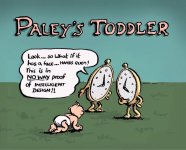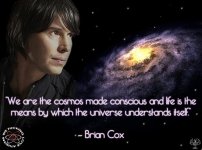What, when, where, how, who, why...
These question markers are at the heart of rational thought and open-minded enquiry.
It amazes me to see supposedly open-minded, rational, free thinkers running a million miles an hour to avoid the ontology of the Who and the Why.
"Why are you a pedophile?"
If you refuse to answer why, then you must be afraid of the answer and "close-minded".
That is the "logic" of your post.
Rational, open minds don't invent meaningless questions just so they can invent a baseless answer that feels good to them. That is what dogmatic religious minds do.
"Why X?" has no meaning unless "Is X?" has already been established. If the Universe didn't actually have a beginning, then "Why it had a beginning" is nonsensical. And ageless and endless expansion-contraction model has no beginning. It doesn't really contradict the Big Bang model, b/c Big Bang theory can only explain the currently observable in the Universe. The theorized singularity would make observing anything prior to it (such as a previous expansion-contraction cycle) impossible. Thus, even if it is true, the claim that there was nothing prior to the Big Bang cannot in principle ever be supported by empirical science. The best we can hope for is that Penrose is correct and a prior expansion-contraction cycle might leave observable evidence and thus refute the "nothing before" assumption. But it might not leave observable evidence, in which case there will never be a rational basis to choose between the possibilities.
On another note, rational explanations usually entail "How?" and not "Why?", b/c "why" generally connotes teleological causality where there is some final ultimate end state or purpose for which the event to be explained occurred. The standard definition of "why" is "the cause, reason, or purpose
for which" The "for which" implies the thing happened because it was useful for reaching some end state. IOW, "why" typically prompts explanations not based on preceding causal factors but upon a future state towards which the present is drawn. Since the future doesn't exist outside of an idea in sentient minds and their goals for the future, "why" explanations are biased towards the willful actions of sentient minds. If one is explanation a behavior of an already established and known to exist creature thought to have mental states, then "why" questions are appropriate. But outside of that they are sloppy shorthand for "how?" or biased attempts by the question askers (in this case Theists) to engage in "begging the question" by implying there must be a why and therefore there must be a sentient mind that is the explanation.
So, even if it established that the universe had a beginning, an answer to "How?" it began makes "Why?" it happened meaningless and/or redundant.



